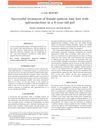26 citations,
January 2005 in “PubMed” RUM-loaded SLN shows promise for treating acne and hair loss topically.
 26 citations,
October 2016 in “Clinics in Dermatology”
26 citations,
October 2016 in “Clinics in Dermatology” Hormonal treatments can improve acne, but they come with potential side effects and risks.
 26 citations,
April 2009 in “Australasian Journal of Dermatology”
26 citations,
April 2009 in “Australasian Journal of Dermatology” Spironolactone successfully treated hair loss in a 9-year-old girl.
 24 citations,
March 2017 in “Archives of Gynecology and Obstetrics”
24 citations,
March 2017 in “Archives of Gynecology and Obstetrics” The study found that women with hyperandrogenic PCOS have higher levels of AKT1 and AKT2 proteins in their cells, which may lead to cell dysfunction.
 24 citations,
January 2013 in “Indian Journal of Dermatology, Venereology and Leprology”
24 citations,
January 2013 in “Indian Journal of Dermatology, Venereology and Leprology” Hormonal treatment is effective for women with acne not helped by usual treatments, especially if they have hormonal imbalances.
24 citations,
February 2007 in “Hormone and metabolic research” The substance MK386 effectively blocked testosterone conversion and reduced cell growth in certain skin cells, but inhibiting 5α-reductase alone may not greatly improve acne.
23 citations,
December 2013 in “Molecular cancer therapeutics” Breast cancer treatments work better with AR activation, improving results and reducing side effects.
 23 citations,
February 2021 in “Journal of Endocrinological Investigation”
23 citations,
February 2021 in “Journal of Endocrinological Investigation” Betacoronaviruses, like COVID-19, may cause hormone system dysfunction and affect disease susceptibility and severity.
 21 citations,
February 2021 in “Frontiers in Endocrinology”
21 citations,
February 2021 in “Frontiers in Endocrinology” Hormones affect prostate health and disease, with certain hormone imbalances linked to prostate cancer and benign prostatic hyperplasia.
 21 citations,
February 2017 in “International Journal of Women's Dermatology”
21 citations,
February 2017 in “International Journal of Women's Dermatology” Hormonal therapies help treat female hair loss, but results are slow and vary.
19 citations,
December 2011 in “PubMed” Inflammation and immunity play a key role in androgenetic alopecia, with better treatment outcomes in certain immune-positive cases.
 19 citations,
October 2017 in “The FASEB Journal”
19 citations,
October 2017 in “The FASEB Journal” Male hormones cause different growth in identical human hair follicles due to their unique epigenetic characteristics.
 19 citations,
April 2014 in “Hormones”
19 citations,
April 2014 in “Hormones” Hormones and genetics play key roles in male and female baldness, which can affect mental health and may be linked to other health issues.
 19 citations,
November 2010 in “PubMed”
19 citations,
November 2010 in “PubMed” New genetic insights have improved understanding of hair loss, leading to a new test and treatments, but more research is needed on the test and laser comb effectiveness.
 19 citations,
March 1998 in “Endocrinology”
19 citations,
March 1998 in “Endocrinology” Male rats have more somatostatin neurons than females due to testosterone converting to estrogen during early development.
 19 citations,
January 1997 in “Endocrinology”
19 citations,
January 1997 in “Endocrinology” Testosterone can slow hair growth in adult monkeys, but a blocker called RU 58841 can counteract this and potentially help hair regrow.
 18 citations,
May 2020 in “Biomolecules”
18 citations,
May 2020 in “Biomolecules” Spironolactone, a heart and liver drug, has new uses including cancer treatment, viral infection prevention, and skin condition improvement.
 18 citations,
July 2010 in “Expert Review of Endocrinology & Metabolism”
18 citations,
July 2010 in “Expert Review of Endocrinology & Metabolism” The document concludes that PCOS has a strong genetic component, but more research is needed to fully understand the specific genes involved.
16 citations,
January 2019 in “Pharmaceutical biology” Lespedeza cuneata extract may help treat enlarged prostate.
 15 citations,
June 2020 in “Experimental Dermatology”
15 citations,
June 2020 in “Experimental Dermatology” Hormones and genes affect hair growth and male baldness.
 15 citations,
January 2010 in “Reproduction, Fertility and Development”
15 citations,
January 2010 in “Reproduction, Fertility and Development” A certain gene variant may increase the risk of polycystic ovary syndrome in Chinese women.
 14 citations,
January 2019 in “Journal of Natural Medicines”
14 citations,
January 2019 in “Journal of Natural Medicines” Chaga mushrooms contain compounds that may promote hair growth better than common treatments.
 14 citations,
July 2011 in “Experimental Dermatology”
14 citations,
July 2011 in “Experimental Dermatology” Applying EGCG on the skin can prevent hair loss caused by testosterone in mice.
 14 citations,
November 2006 in “Current Medicinal Chemistry”
14 citations,
November 2006 in “Current Medicinal Chemistry” New treatments for enlarged prostate are being developed to be more effective and have fewer side effects.
 14 citations,
April 2006 in “Expert Review of Dermatology”
14 citations,
April 2006 in “Expert Review of Dermatology” Antiandrogen therapy helps treat genetic hair loss.
 13 citations,
December 2020 in “Dermatologic Therapy”
13 citations,
December 2020 in “Dermatologic Therapy” Sebaceous glands in our skin, developing during pregnancy and active in puberty, produce sebum for skin lubrication, temperature control, and fighting germs, also help in hormone regulation, and their dysfunction can cause conditions like acne and hair loss.
13 citations,
September 2017 in “Life sciences” Androgens may influence bladder cancer progression by affecting cellular behavior.
 11 citations,
January 1998 in “Dermatology”
11 citations,
January 1998 in “Dermatology” Spironolactone works well for acne and hirsutism, isotretinoin is very effective for acne and may have antiandrogenic effects, and 5 alpha-reductase inhibitors should be considered antiandrogens.
 11 citations,
August 1997 in “Expert Opinion on Therapeutic Patents”
11 citations,
August 1997 in “Expert Opinion on Therapeutic Patents” Many potential alopecia treatments need more testing to confirm they promote acceptable hair growth with minimal side effects.
 10 citations,
May 2019 in “International Journal of Environmental Research and Public Health”
10 citations,
May 2019 in “International Journal of Environmental Research and Public Health” Finasteride may cause kidney damage.























